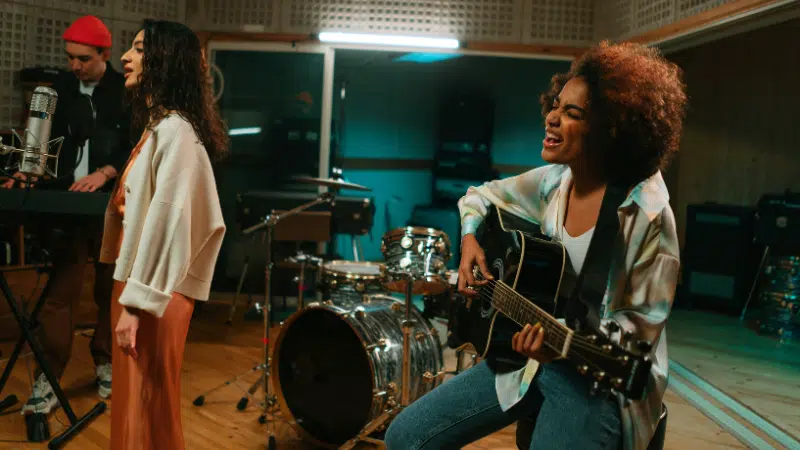Mental health is deeply personal. As a label, you walk a fine line between wanting to support the artists in your community and recognizing the realities of running a business. It’s a common misconception that every company only cares only about the bottom line. Thankfully, today’s leaders are changing this narrative. Not only that, but artists expect (and deserve) more. The importance of real human connection, on being seen and heard, offering support at every stage of their journey, all of this is what makes a healthy business. And as a label, it’s your job to build this trust. It’s up to management to approach these conversations from a place of care, not obligation.
When your artists know that your check-ins are thoughtful, genuine, and consistent (not only when things are “bad”), it creates a foundation where real conversations can happen and creative minds can truly thrive, no matter the obstacle. In this article, we’ll walk you through how label teams can respectfully support artists, ask the right questions, honor boundaries, and offer resources to build a supportive, sustainable environment for everyone. 🌱
Everything You Need To Know About Supporting Artists Through Thoughtful Mental Health Check-Ins
How To Start With the Right Approach
These conversations are typically led by the people closest to an artist’s day-to-day experience. That means management plays the key role here. The goal isn’t to fix problems or pry into personal struggles; it’s to show that you care, you’re available if needed, and they have the space to open up if they need to.
If a conversation feels forced, rushed, or out of sheer corporate obligation, it can do more harm than good. You need simple, consistent gestures. A casual “How’s your week going?” or just checking in after a big release sends the message that you’re present without putting too much pressure on things. Over time, this approach is what builds trust, and trust is what will help them to open up when it really matters, creating a foundation for both personal well-being and creative growth.
Building Trust and Consistency
Anyone with a little bit of life experience can tell you… Trust doesn’t happen overnight. It’s something that grows over time. Regular check-ins, even small ones, let artists know that support isn’t just reactive or reserved for crises. It shows that management actually cares about their well-being on an ongoing basis.
Consistency can take many forms. A quick message to see how things are going and post-release follow-ups are just the beginning. They also take the form of remembering key dates or milestones, checking in after tours or intense recording sessions, and simply following up on a previous conversation to show you were listening. Over time, these small, reliable gestures create that sense of safety where artists feel comfortable sharing both challenges and successes. The goal is to make these check-ins feel natural, like a part of the rhythm of working together, rather than a performative obligation.
Respecting Boundaries
Even if you’ve built the most comfortable, trusting team in the game, it’s important to remember that these check-ins aren’t therapy sessions. Management’s role is to offer support, not solve personal issues or dig into areas the artist isn’t ready to share. Knowing where to draw the line is essential for maintaining a healthy, respectful relationship.

Setting boundaries like respecting the artist’s time, not pressuring them to talk, and keeping discussions focused on their well-being in a professional context is very important. Pay attention to verbal and non-verbal cues. If an artist seems uncomfortable or reserved, acknowledge that and give them space. You aren’t a trained therapist, so don’t act like you know more than they do.
For example… If an artist mentions feeling overwhelmed after a tour, acknowledge it and ask if they need rest or support coordinating their schedule, rather than probing into the reasons behind their stress.
Respecting their boundaries in itself is an act of kindness and support. And if someone needs deeper help, remember that you aren’t the one to “cure” them. Redirecting them to professional support, like a mental health provider or counselor, is the best way to ensure they get the help they need.
Finding the right balance comes from listening, observing, and adapting to each person’s preferences. When done correctly, respecting these boundaries reinforces the trust you’ve worked so hard to build up to this point.
Offering Resources
When it comes to mental health support, knowing what to offer (and how to share it) makes a huge difference. As management, you don’t need to be a therapist; you just need to make sure they know help is available and accessible. Some great resources we love here at Symphonic include:
- Backline: Offers case-managed support and connects music professionals with vetted mental health providers who understand the unique pressures of the industry.
- MusiCares: Provides financial assistance, counseling referrals, and wellness programs for music professionals dealing with mental health or addiction challenges.
- Silence the Shame: Focused on reducing stigma and fostering community, they provide wellness education, peer support, and resources for musicians navigating mental health challenges.
Aside from a managerial standpoint, there are tons of resources out there for creatives and musicians alike who are struggling with their mental health. If you need it, help is out there. We wrote a whole article with 12 organizations that have made it their mission to support those in need. // Check out “Mental Health Resources for Musicians in 2025” to learn more. ❤️🩹
How To Integrate Resources Into Check-Ins
When it comes to sharing resources, it’s best not to wait until someone is struggling. Bring them up as proactively as possible, preferably as part of regular check-ins and in commonplace language. Normalizing access to support is what helps people feel more comfortable reaching out when they need it.
Offer options, not directives. Let them choose what feels right for them. You can make this even easier by creating a “mental health toolkit” with links, hotlines, and program descriptions that they can access anytime. This toolkit should include resources like:
- Links to organizations like Backline, MusiCares, etc.
- Numbers for crisis hotlines
- Guided meditation or stress-management resources
- Tips for pacing recording sessions or planning rest days
- Community support networks
- and more…
Don’t stop there! Feel free to include anything you see fit here that could be of use. Then, this wonderful toolkit can live on a shared drive, in a private team document, or anywhere artists can easily access it whenever they need to.
Following Up Without Overstepping
After all of this, the next step to master is the gentle follow-up. This can be simple and casual, a message like “Hey, just checking in, did you get a chance to look at any of the resources we shared?” or even simpler with a “How’s everything going this week?” Keep it light and optional, no pressure. If an artist doesn’t respond, don’t push it. You can always revisit it later at a more natural time. If you remain consistent with these, it won’t feel forced or obligatory; it’ll be a natural part of how your team works together.
These can also serve as internal check-ins to keep track of how things are going (without making it feel like monitoring, of course). For example, note when resources were shared, or when an artist mentioned a particular stressor, so future conversations are informed but still respectful. This ensures continuity, shows attentiveness, and helps management provide meaningful support when needed.
In Conclusion…
Running a label in this day and age gives you the unique opportunity to make a change in how corporations treat their people. Approaching mental health check-ins thoughtfully, not because it’s the “woke” thing to do, creates a culture where people feel truly valued, supported, heard, and appreciated.
And this culture doesn’t just benefit the artists who work with you, it shapes the way your entire team works, the kind of creative environment you foster, and even the legacy your label leaves in the industry. Small, intentional acts of care can ripple outward, proving that business success and human decency aren’t mutually exclusive. They are two sides of the same coin.
—
All of us have experienced the damage done by the pressures of this industry to some of our greatest minds. From Avicii to Mac Miller, these issues affect everyone and anyone. Through de-stigmatizing the way we talk about mental health, we reassure those suffering from it that they can feel comfortable asking for help when they need it. Everyone should have the resources to reach out without judgment and move forward with confidence.
If you’re an artist looking for additional resources to feed your brain something good, check these out:
How to Build a Pre-Show Ritual That Supports Your Mental Health
Breaking The Stigma: Let’s Talk About Therapy in the Music Industry
How to Protect Your Mental Health on Social Media as an Artist



